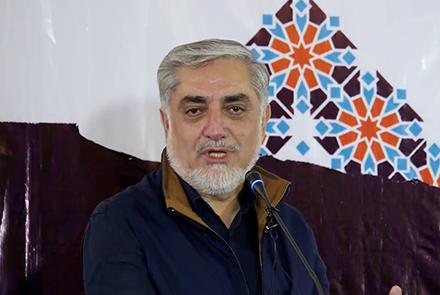Addressing the 4th Afghanistan-Central Asia Dialogue conference in Bamiyan on Friday, Chief Executive Abdullah Abdullah said there is no difference between Taliban, Daesh and al-Qaeda and that there is a need for regional consensus against terrorism.
The conference was organized by Afghanistan Strategic Studies Institute.
Representatives from more than 10 Asian and European countries, the United States, the United Nations and NATO attended the conference to discuss mechanisms to improve Afghanistan’s trade and political ties with the Central Asian countries as well to talk on improving regional cooperation in the fight against terrorism.
The chief executive said the Taliban has been fighting in Afghanistan for the interests of other countries.
Referring to Pakistan and Iran, Abdullah said a number of countries in the region differentiate between terrorist groups adding that “such differentiation is a big mistake”.
“Differentiating between good and bad terrorists or differentiating between al-Qaeda, Daesh, Taliban or other groups that carry out terrorist activities is not correct. From our point of view, there is no difference between terrorists," said Abdullah.
He said Afghanistan has endured biggest sacrifice in the war against terrorism.
“Our cooperation in economy and cultural sectors is better, but in fighting against terrorism and terrorist groups, I think a big part of the work has been put on Afghans' shoulders,” he added.
He stressed the need for a regional consensus against terrorism.
At the same event, former head of the National Directorate of Security, Amrullah Saleh, said Pakistan supports terrorism to put pressure on Kabul to recognize the Durand Line as an international border between Afghanistan and Pakistan, influence the Afghan foreign and economic policies and to establish a puppet government in the ARG – the presidential palace.
“Remember, political Islam is not Islam, it is a school of thought. And remember radical Islam is not Islam; it is a school of thought. And terrorism takes its interpretation to some extent from these two schools of thoughts. And the epicenter of these three phenomena are today in Pakistan,” said Saleh.
Bamiyan governor Mohammad Tahir Zuhair meanwhile called for a change in the current situation in the region.
“We cannot achieve security alone; it is an achievement which can be gained jointly and its absence will affect the region and the world,” the governor said.
Head of Afghanistan Strategic Studies Institute, Daud Moradian, said various factors, namely insecurity, have distanced and divided the regional nations.
He said a regional agreement is required to create trust among countries in the region.
“We are looking for a regional agreement. We surely believe that through dialogue we can reach the agreement and will know each other much better,” said Muradian.
Other participants of the conference, however, said the international community’s efforts “have not been successful in Afghanistan”.
“Who appoint everybody? We don't have the right to elect our own political officers. We don't have the right to hire our own civil servants.This is an act that happen 200 years ago in Europe,” said Nazif Shahrani, a lecturer in the United States’ Indiana University.
The Afghanistan-Central Asia Dialogue is being held every year or every two years to seek logical solutions for regional problems.
The 3th Afghanistan-Central Asia Dialogue was held in northern Balkh province two years ago.


